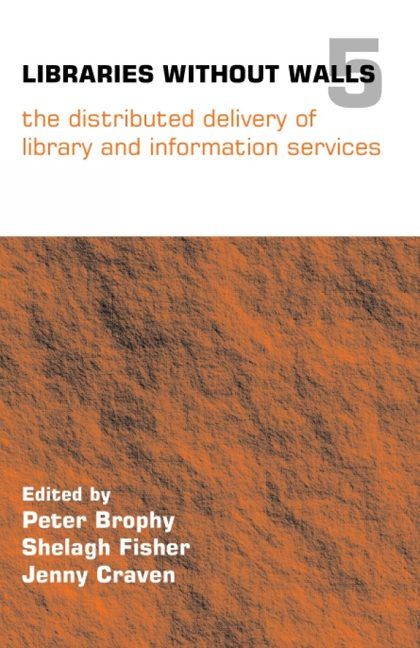Book contents
- Frontmatter
- Contents
- Contributors
- 1 Introduction
- 2 Keynote paper: beyond the mainstream of library services
- THEME 1 THE INTEGRATION OF LIBRARY SERVICES AND VIRTUAL LEARNING ENVIRONMENTS
- THEME 2 THE RELATIONSHIP BETWEEN USER NEEDS, INFORMATION SKILLS AND INFORMATION LITERACIES
- THEME 3 USABILITY AND ACCESSIBILITY OF DIGITAL LIBRARY SERVICES
- THEME 4 DESIGNING THE INFORMATION ENVIRONMENT: NATIONAL AND INSTITUTIONAL PERSPECTIVES
- THEME 5 THE CREATION OF DIGITAL RESOURCES BY USER COMMUNITIES
- Index
- Miscellaneous Endmatter
- Miscellaneous Endmatter
- misc-endmatter
- Miscellaneous Endmatter
2 - Keynote paper: beyond the mainstream of library services
Published online by Cambridge University Press: 08 June 2018
- Frontmatter
- Contents
- Contributors
- 1 Introduction
- 2 Keynote paper: beyond the mainstream of library services
- THEME 1 THE INTEGRATION OF LIBRARY SERVICES AND VIRTUAL LEARNING ENVIRONMENTS
- THEME 2 THE RELATIONSHIP BETWEEN USER NEEDS, INFORMATION SKILLS AND INFORMATION LITERACIES
- THEME 3 USABILITY AND ACCESSIBILITY OF DIGITAL LIBRARY SERVICES
- THEME 4 DESIGNING THE INFORMATION ENVIRONMENT: NATIONAL AND INSTITUTIONAL PERSPECTIVES
- THEME 5 THE CREATION OF DIGITAL RESOURCES BY USER COMMUNITIES
- Index
- Miscellaneous Endmatter
- Miscellaneous Endmatter
- misc-endmatter
- Miscellaneous Endmatter
Summary
Introduction
The ideas behind the Libraries Without Walls series of conferences, of which this is the fifth, can be traced back to a number of different roots. Some of these were concerned with the ways in which information technology might be used to deliver library services – and as such they go back at least to the early 1970s. Other ideas concerned the delivery of education, and especially experiments and services that sought to deliver to the learner rather than expecting the learner to come to an institution – distance learning concepts that can be traced back even further, and were well developed in many countries by the middle of the 20th century. Yet other concepts arose from beliefs in the importance of widespread participation in society and thus in learning, and the imperative to find ways to involve the disenfranchised. Draw these together – technology, delivery and universal participation – and the stage is set for new ways of thinking about library services.
One result of this kind of thinking was that by the early 1990s most libraries had come to accept that their role was better described as the provision of access to information sources than as the custody of physical artefacts – although of course there were exceptions, for example among national and highly specialist libraries. But as the access paradigm started to dominate, new methods of service delivery began to appear. The question became whether remote delivery, digitizing content, deploying electronic networks and exploiting the ever more widespread ownership of personal computers could offer a new way to think about, conceptualize and run the library.
It was at this point that the BIBDEL project was conceived. Funded by the European Commission's Libraries Programme it brought together three academic libraries – those of the University of Central Lancashire (UCLAN) in the UK, Dublin City University (DCU) in Ireland and the University of the Aegean (UAe) in Greece – to explore the potential of electronic delivery of library services to distant users. The co-ordinating partner, UCLAN, worked with students taking university courses at small, remote colleges across the north-west of England.
- Type
- Chapter
- Information
- Libraries Without Walls 5The Distributed Delivery of Library and Information Services, pp. 7 - 16Publisher: FacetPrint publication year: 2004



